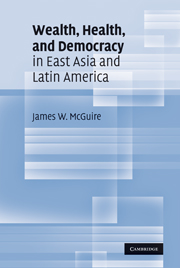Crossref Citations
This Book has been
cited by the following publications. This list is generated based on data provided by Crossref.
Falleti, Tulia G.
2009.
Explaining Institutional Change.
p.
38.
Lehoucq, Fabrice
2010.
Political Competition, Constitutional Arrangements, and the Quality of Public Policies in Costa Rica.
Latin American Politics and Society,
Vol. 52,
Issue. 4,
p.
53.
Kuhn, Randall
2010.
Routes to Low Mortality in Poor Countries Revisited.
Population and Development Review,
Vol. 36,
Issue. 4,
p.
655.
2010.
Publications Received.
Contemporary Sociology: A Journal of Reviews,
Vol. 39,
Issue. 6,
p.
766.
Cammett, Melani Claire
and
MacLean, Lauren M.
2011.
Introduction: the Political Consequences of Non-state Social Welfare in the Global South.
Studies in Comparative International Development,
Vol. 46,
Issue. 1,
p.
1.
Gómez, Eduardo J.
2011.
Pursuing Centralization amidst Decentralization: The Politics of Brazil's Innovative Response to HIV/AIDS.
Journal of Politics in Latin America,
Vol. 3,
Issue. 3,
p.
95.
Pushkar
2012.
Democracy and Infant Mortality in India’s ‘Mini-democracies’: A Preliminary Theoretical Inquiry and Analysis*.
Journal of South Asian Development,
Vol. 7,
Issue. 2,
p.
109.
Drope, Jeffrey
and
Ross, Hana
2012.
Treaty Compliance in Low- and Middle-Income Countries: Evidence from Global Health.
SSRN Electronic Journal,
Ranis, Gustav
and
Stewart, Frances
2012.
Success and Failure in Human Development, 1970–2007.
Journal of Human Development and Capabilities,
Vol. 13,
Issue. 2,
p.
167.
Vom Hau, Matthias
2012.
State Capacity and Inclusive Development: New Challenges and Directions.
SSRN Electronic Journal,
Joshi, Devin K.
2012.
Varieties of Developmental States.
Journal of Developing Societies,
Vol. 28,
Issue. 3,
p.
355.
Chapman, Audrey R.
and
Benegal, Salil D.
2013.
The State of Economic and Social Human Rights.
p.
61.
Roller, Edeltraud
2013.
Comparing the performance of autocracies: issues in measuring types of autocratic regimes and performance.
Contemporary Politics,
Vol. 19,
Issue. 1,
p.
35.
Gómez, Eduardo J.
2013.
An Interdependent Analytic Approach to Explaining the Evolution of Ngos, Social Movements, and Biased Government Response to AIDS and Tuberculosis in Brazil.
Journal of Health Politics, Policy and Law,
Vol. 38,
Issue. 1,
p.
123.
McGuire, James W.
2013.
Political regime and social performance.
Contemporary Politics,
Vol. 19,
Issue. 1,
p.
55.
Pushkar
2013.
Nation or State? Where Should We Look to Measure Democracy's Effects on Health?.
Forum for Development Studies,
Vol. 40,
Issue. 2,
p.
217.
Murdie, Amanda
and
Hicks, Alexander
2013.
Can International Nongovernmental Organizations Boost Government Services? The Case of Health.
International Organization,
Vol. 67,
Issue. 3,
p.
541.
Wurster, Stefan
2013.
Comparing ecological sustainability in autocracies and democracies.
Contemporary Politics,
Vol. 19,
Issue. 1,
p.
76.
Martínez Franzoni, Juliana
and
Sánchez-Ancochea, Diego
2014.
Filling in the Missing Link between Universalism and Democracy: The Case of Costa Rica.
Latin American Politics and Society,
Vol. 56,
Issue. 4,
p.
98.
Schmidt, Manfred G.
2014.
Handbuch Vergleichende Politikwissenschaft.
p.
1.



